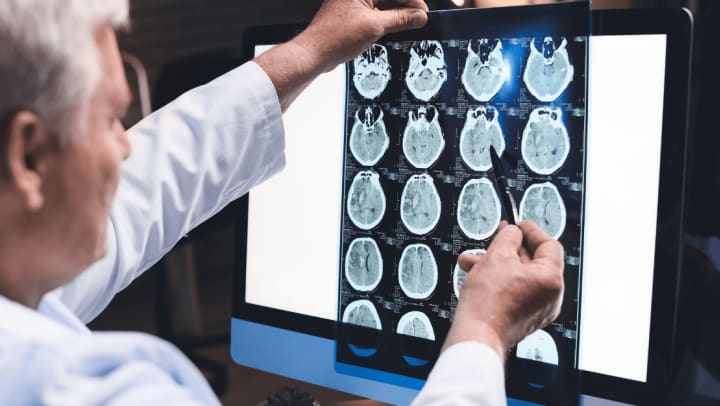Alzheimer's Diagnosis: Modern Methods Explained
Alzheimer's diagnosis once required an autopsy to confirm with certainty - a reality that persisted until the early 2000s. Today's medical advances offer families answers while meaningful action remains possible. Doctors now approach memory care and dementia symptoms with tools that provide clarity during life, not after.
Your physician has access to sophisticated diagnostic methods, including blood tests that detect specific Alzheimer s-related proteins. These evaluations blend physical assessments, neurological examinations, cognitive tests and detailed brain imaging. This careful process delivers more accurate diagnoses, giving you precious time to consider plans and explore available treatments sooner.
This guide walks you through the Alzheimer's diagnosis journey from first warning signs to current testing approaches. You'll discover the range of diagnostic tools medical professionals use and how these methods work together to provide timely, accurate answers when memory concerns arise.
Recognizing Early Signs That Warrant Medical Attention
Noticing memory changes in yourself or someone you care about often triggers worry. While some forgetfulness naturally accompanies aging, specific symptoms point to issues that deserve medical attention.
Normal aging brings occasional memory slips - misplacing keys but remembering where to look or briefly forgetting a name during conversation. These minor lapses rarely disrupt daily routines and typically resolve quickly.
Memory concerns that signal a need for medical evaluation include:
-
Asking the same questions over and over
-
Becoming disoriented in familiar surroundings
-
Struggling to follow simple instructions or recipes
-
Showing increased confusion about time, people or places
-
Finding everyday tasks like meal preparation or bill payments difficult
-
Losing items and being unable to trace steps back to find them
-
Showing unexpected shifts in mood or personality
When worrisome signs appear, contact your doctor. Their evaluation can determine whether symptoms stem from Alzheimer's or treatable issues like vitamin shortages, thyroid problems or medication effects.
Getting answers early opens doors to appropriate care planning and gives you and your family valuable preparation time.
Remember that many symptoms mimicking dementia care in South Tulsa, OK, actually come from treatable conditions, making prompt medical assessment especially valuable.
The Initial Diagnostic Process: First Steps
When memory concerns bring you to your doctor, the diagnostic journey begins with key evaluations. Unlike many health conditions that have a single definitive test, Alzheimer's diagnosis requires multiple approaches working together.
Your healthcare provider starts with a detailed medical history review. You'll discuss your symptoms when changes began, your medications and your family health patterns. Bringing someone who knows you well proves invaluable here—they often notice memory or behavior changes you might miss.
Brief cognitive assessments typically follow. These simple screening tools check your memory, thinking abilities and mental status. Next comes a thorough physical examination, checking your overall health and vital signs. This step matters because conditions like thyroid issues, vitamin shortages or medication effects sometimes create symptoms that resemble dementia.
Throughout these steps, your doctor watches whether symptoms interfere with your daily activities – a crucial factor in Alzheimer's diagnosis. This careful initial evaluation builds the foundation for reaching conclusions or determining which advanced tests might help provide answers.
Advanced Diagnostic Methods in Memory Care
Alzheimer's diagnosis has grown more precise, with brain imaging and biomarker testing now working alongside traditional evaluations. When initial assessments point to cognitive concerns, your doctor might suggest specialized tools to confirm whether Alzheimer's is present.
Neuroimaging Technologies
Neuroimaging shows detailed pictures of your brain's structure and function. MRI scans help doctors spot brain shrinkage, especially in the hippocampus—an area that often shows a 15-25% volume reduction in people with mild Alzheimer's. These scans also help rule out other possible causes, like tumors or strokes.
PET scans offer even deeper insights by revealing significant brain changes:
-
Amyloid PET scans find the beta-amyloid protein deposits typical in Alzheimer's
-
Tau PET scans detect neurofibrillary tangles, another tell-tale sign
-
FDG PET scans measure how your brain uses glucose, showing reduced activity in affected areas
Biomarker Testing
Spinal fluid analysis has become a valuable diagnostic tool. Through a spinal tap, doctors measure specific proteins:
-
Beta-amyloid 42 (lower in Alzheimer's)
-
Total tau and phospho-tau (higher in Alzheimer's)
Blood tests show particular promise for detecting Alzheimer's markers. These newer tests measure specific proteins like phosphorylated tau (p-tau181 and p-tau217) that leak from the brain to the bloodstream. With 90-95% accuracy in finding amyloid issues, these less invasive options may soon become the standard approach.
Progress in Identifying Alzheimer's
Medical science has made remarkable progress in Alzheimer's diagnosis, giving families earlier answers and valuable preparation time. While hearing such news remains difficult, today's diagnostic methods offer clearer insights when there's still an opportunity to act.
Healthcare providers don't rely on just one test. Instead, they blend cognitive assessments, brain imaging and biomarker testing for a thorough evaluation. This careful approach helps separate Alzheimer's from other treatable conditions with similar symptoms.
Knowledge about these diagnostic tools helps you participate actively in your healthcare decisions. Remember that early evaluation creates the best foundation for proper care planning when facing memory concerns. Many families discover comfort through professional memory care settings. Learn more about specialized memory care options by scheduling a visit at Iris Memory Care of Tulsa at (918) 940-1800.
FAQs
Q1. What are the modern methods used to diagnose Alzheimer's disease?
Modern diagnostic methods for Alzheimer's include comprehensive medical history reviews, cognitive assessments, physical examinations, brain imaging technologies (such as MRI and PET scans), biomarker testing through blood and cerebrospinal fluid analysis and in some cases, genetic testing.
Q2. What are the early signs of Alzheimer's that warrant medical attention?
Early signs that may indicate a need for medical evaluation include repeatedly asking the same questions, getting lost in familiar places, difficulty following instructions, increased confusion about time or place, struggles with daily tasks, misplacing items, inability to retrace steps and noticeable changes in mood or personality.
Q3. How does brain imaging help in diagnosing Alzheimer's?
Brain imaging techniques like MRI can reveal brain shrinkage, particularly in the hippocampus, while PET scans can detect amyloid protein deposits, neurofibrillary tangles and changes in brain metabolism. These imaging methods help differentiate Alzheimer's from other conditions and provide visual evidence of disease-related brain changes.


